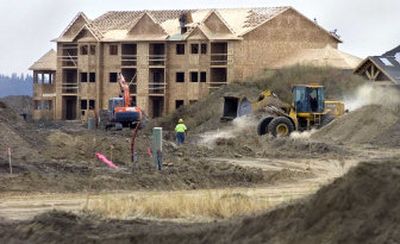Building moratorium OK’d

Spokane County commissioners put a temporary halt to residential construction in the West Plains Tuesday in an effort, they said, to stop encroachment to the Spokane International Airport and Fairchild Air Force Base.
For six months the county will not accept new applications for homes and apartments in a light industrial zone, which is more than 10 square miles between Fairchild and Spokane.
“It’s a prudent and reasonable step,” said Neal Sealock, the airport’s director. “All we’re trying to do is safeguard the capacity of the airport.”
Some who attended Tuesday’s meeting criticized the lack of a public hearing on the topic.
“It was just a coincidence that we found out,” said real estate agent Pete Thompson. “How often do you see a moratorium approved right out of the chute with no public input?”
During the housing ban, commissioners said they would examine new development regulations in the area. Homes were allowed on most of the land affected by the moratorium, except certain areas deemed more likely for a crash to occur.
The county has allowed residential building in the light industrial zone for about a year. A few residential projects have been approved in that time, but those have been met with concerns from Fairchild, airport and state aviation leaders.
“As we have seen in other communities, such situations lead to conflicts that ultimately disrupt the operation of airports as essential public facilities,” wrote state aviation planner Kerri Woehler, in response to an apartment complex proposal that later was approved by the county. “… It is critical that every effort be made to discourage incompatible land uses that impair the ability of the airport to operate and expand.”
County officials said they will hold a public hearing on the moratorium within 60 days.
“This is the most screwed up county commissioner vote I’ve seen in my life,” said Richard Vandervert, who is building an apartment complex in the zone. “You don’t say we’re going to shut down the whole West Plains and then say we’re going to study it.”
This year, the county issued a building permit for about half of the 300-unit complex Vandervert eventually hopes to build. He said he’s already invested money for the infrastructure for the full project, but the other units are in jeopardy because he hasn’t applied yet for the permit for the next phase.
Vandervert said banning residential uses will slow county growth and its future tax base because the light industrial zone has attracted little industrial development.
Supporters of the moratorium said the health of the airport and securing Fairchild’s future are far more important to the health of the county.
Commissioner Phil Harris, who proposed the moratorium, said the move was prompted because of the concerns raised by airport leaders and business officials involved in the effort to preserve Fairchild. Encroachment recently was a topic in a debate between Harris and Bonnie Mager, who is challenging him in the November election.
Mager accused the county of threatening the base by approving a residential subdivision just near the zone affected by Tuesday’s vote. In that case, the Air Force wrote a letter reminding the county that the 288-lot development would be located in an area affected by loud plane noise where development would be strongly discouraged.
“I’m glad to see that my campaign is lighting a fire under Phil Harris,” Mager said. “Whatever it takes, we want good government.”
Harris said, if anything, the decision would have hurt his campaign because it angered some of his supporters.
“I have never made a vote on how it will help me politically,” Harris said. “We’ve been working on it for months. It was just time to ring the bell.”